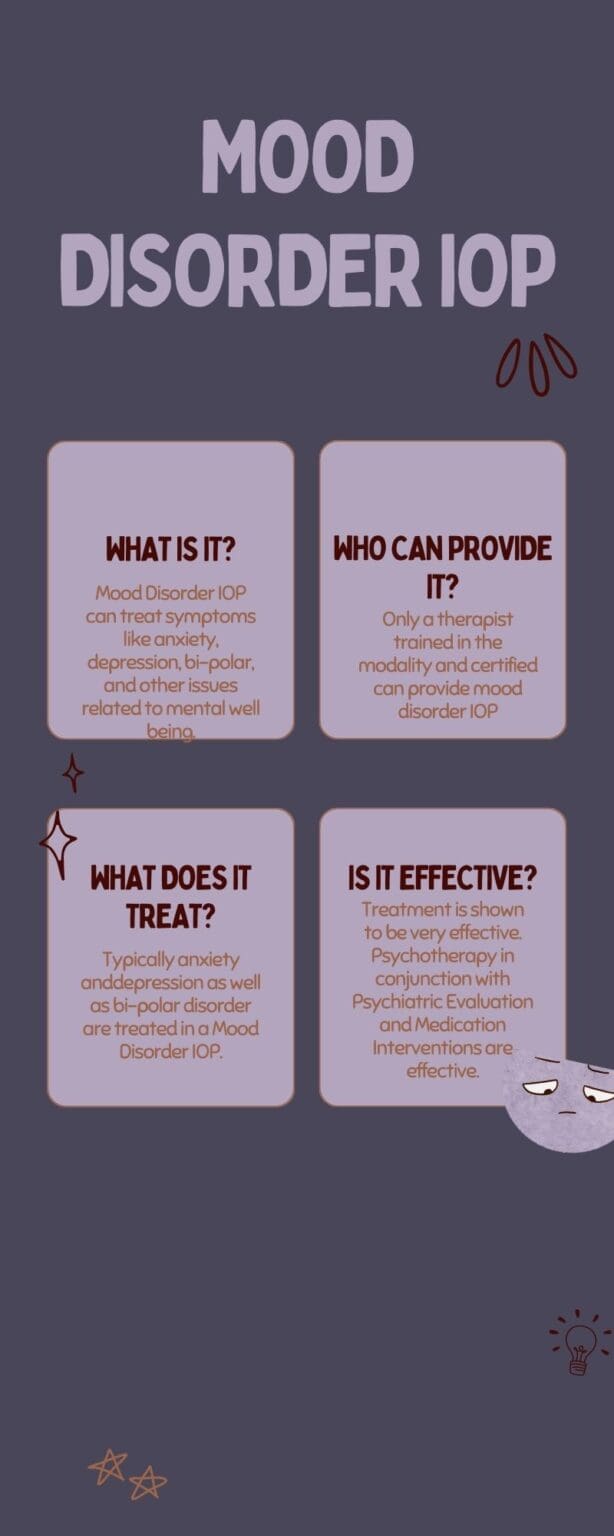What is a Mood Disorder Intensive Outpatient Program?
Mood Disorder Intensive Outpatient is a flexible program that allows clients to receive treatment without staying overnight. It consists of therapy, medication management, and group support. The program focuses on developing coping skills, stress management, and relaxation techniques. The treatment is suitable for those who require intensive treatment but have other commitments. It is a short-term program with flexible hours, and clients can go back to their routine after sessions.
A mood disorder is a mental health condition characterized by significant and persistent changes in a person’s emotional state or mood. These changes can include periods of intense sadness, irritability, or elevated mood and can impact a person’s ability to function in daily life. Mood disorders can be caused by a combination of genetic, environmental, and biological factors, and can range in severity from mild to severe. Examples of mood disorders include major depressive disorder, bipolar disorder, and persistent depressive disorder.
According to the National Alliance on Mental Illness (NAMI), approximately 1 in 5 adults in the United States experiences mental illness in a given year. This statistic may vary in different regions and populations, including Massachusetts. It’s important to note that mental health is a complex and multifaceted issue, and the prevalence of mental health issues may be difficult to quantify accurately.
Resilience Behavioral Health provides Anxiety Treatment and Co-Occurring Rehab Program in Massachusetts. The program can be accessed remotely via telemedicine or in-person.

What is a Mood Disorder?
A mood disorder is a type of mental health condition that involves significant changes in a person’s emotional state or mood, which can impact their ability to function in daily life.
- Major depressive disorder: persistent sadness, loss of interest, and energy.
- Bipolar disorder: cycling between episodes of depression and mania.
- Persistent depressive disorder: chronic low mood and feelings of hopelessness.
- Cyclothymic disorder: chronic mood swings between mild depression and hypomania.
- Seasonal affective disorder: depression that occurs during the winter months.
- GAD: Generalized Anxiety Disorder
Who Benefits from a Mood Disorder Intensive Outpatient Program?
Mood Disorder Intensive Outpatient Programs (IOPs) are designed to help individuals struggling with mood disorders to receive specialized care in a structured and supportive environment. These programs typically involve several hours of therapy and treatment each week, but patients can still live at home and maintain their daily routines.
People who may benefit from a mood disorder IOP include individuals who are experiencing significant interference in their daily lives due to anxiety symptoms. This can include individuals who are struggling with generalized anxiety disorder, panic disorder, social anxiety disorder, obsessive-compulsive disorder, post-traumatic stress disorder, and other anxiety-related conditions.
Mood Disorder IOPs can be especially helpful for those who have tried outpatient therapy or medication treatment and have not experienced significant improvement in their symptoms. The intensive nature of these programs allows for more focused and personalized treatment, which may be more effective in helping individuals develop coping skills and tools to manage their anxiety.
Additionally, individuals who are unable to commit to full-time inpatient treatment due to work or family obligations may find an IOP to be a more flexible and convenient option. Participants in an anxiety IOP can still maintain their daily routines while receiving specialized care and support.
Overall, Mood Disorder IOPs are designed to help individuals manage their anxiety symptoms and improve their overall quality of life. They provide a supportive and structured environment where patients can work towards recovery with the guidance of trained professionals.
Resilience Behavioral Health's Mental Health Mood Disorder Intensive Outpatient Program Track
Resilience Behavioral Health is a dual diagnosis treatment center which is equipped with the Clinical Staff to treat:
- Depression
- Anxiety disorders, such as generalized anxiety disorder (GAD), panic disorder, social anxiety disorder, and post-traumatic stress disorder (PTSD)
- Bipolar disorder
- Personality disorders, such as borderline personality disorder (BPD)
- Schizophrenia and other psychotic disorders
- Obsessive-compulsive disorder (OCD)
- Attention-deficit/hyperactivity disorder (ADHD)
- Emotional Distress
- It’s important to note that a dual diagnosis treatment program is designed to provide specialized care. It is for individuals with co-occurring substance use and mental health disorders. This means that the program is equipped to address both the substance use disorder and the mental health disorder. It can help individuals develop the skills and strategies needed to manage both conditions over the long term. The specific treatment modalities used will depend on the individual’s unique needs. It may include a combination of medication, therapy, and other interventions. It will be staffed by providers with training in both Substance Use and Psychological Conditions.
Is a Mood Disorder Intensive Outpatient covered by insurance?
Yes, in the United States, dual diagnosis treatment is typically covered by insurance, including private insurance. Medicaid, and Medicare are also covering this treatment. Under the Affordable Care Act (ACA), insurance plans are required to cover mental health and substance abuse treatment. They must cover the same level as other medical services. This means that individuals with co-occurring disorders have the right to access affordable, comprehensive care.
The level of coverage for dual diagnosis treatment may vary depending on the specific insurance plan. Most plans cover a range of services, including inpatient and outpatient treatment, medication management, and therapy. How to determine your insurance coverage for dual diagnosis treatment? It’s important to contact your insurance provider directly. You can work with the treatment program’s staff to verify your insurance benefits and coverage.
It’s important to note that while insurance can help cover the cost of dual diagnosis treatment, there may still be out-of-pocket costs. This includes copays or deductibles. Some treatment programs may also offer financial assistance. Sliding scale fees for individuals who cannot afford to pay the full cost of treatment are available.
For a completely confidential, free, and expert consultation give Resilience Behavioral Health a call today at (888)-401-1179 and speak with a treatment placement specialist.

